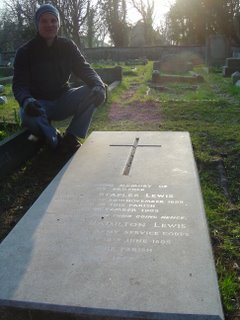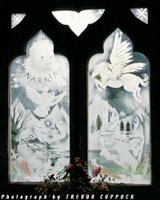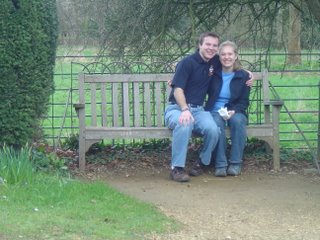Thursday, April 13, 2006
Wednesday, April 05, 2006
Oxford vs. Cambridge, a national event
This past week several of the student in my house traveled to London to take part in the greatest English rivalry-- Oxford vs. Cambridge. As both schools go back into the middle ages, there is more tradition between the schools than any rivalry in America. England also has the distinction of boasting only two state school, Oxford and Cambridge. There couldn't be any other rivalry even if they tried!
April second was the date of both the football (soccer) match and regatta (8-man crew). When I purchased my ticket to the football game, I was under the impression that this was the main event. I mean, Europe in general and England in particular are known for their love of football, right?
Having been to a football match in Europe (Romania) previously, I was expecting a raucous crowd, but went away disappointed. English fans don't get excited. There were a couple of spirited cheers for Oxford (and against Cambridge), but nothing to the level I expected. Michigan football and Hockey games are much more spirited, in my opinion.
The crowd of about 1,200 students, family, alumni, and miscellaneous supporters watched Cambridge beat the Oxford Blues 1-0 on a silly goal midway through the second half. While the players were excited and disappointed at their victory or defeat (depending on which side you were on), the fans accepted the outcome without a fuss. It was very anticlimactic.
Having seen the football match, I was expecting to walk outside and watch the boat race without much difficulty or fanfare. I thought the main event was over.
I was wrong.
Over 250,000 people smashed themselves onto the banks of the Thames to watch sixteen men toil their way over 4.25 mile course. I had to laugh as I watched because boat racing is the worst spectator sport that can be imagined! From my vantage point near the start of the river, I could observe the race for perhaps 1 of the 4.25 mile course. After leaving the sight, everyone picked up and left. We had no idea who was ahead or who would win! It wasn't until the bus driver announced the Oxford victory on the way home that we knew the outcome.
 However, it was a very exciting, and a culturally enriching experience. I felt apart of the long history between the two universities. It was a day well spent.
However, it was a very exciting, and a culturally enriching experience. I felt apart of the long history between the two universities. It was a day well spent.
If you are interested in more background on the Oxford Cambridge Regatta, or would like to watch the entire race via video, check out The Boat Race Website.

April second was the date of both the football (soccer) match and regatta (8-man crew). When I purchased my ticket to the football game, I was under the impression that this was the main event. I mean, Europe in general and England in particular are known for their love of football, right?
Having been to a football match in Europe (Romania) previously, I was expecting a raucous crowd, but went away disappointed. English fans don't get excited. There were a couple of spirited cheers for Oxford (and against Cambridge), but nothing to the level I expected. Michigan football and Hockey games are much more spirited, in my opinion.
The crowd of about 1,200 students, family, alumni, and miscellaneous supporters watched Cambridge beat the Oxford Blues 1-0 on a silly goal midway through the second half. While the players were excited and disappointed at their victory or defeat (depending on which side you were on), the fans accepted the outcome without a fuss. It was very anticlimactic.
Having seen the football match, I was expecting to walk outside and watch the boat race without much difficulty or fanfare. I thought the main event was over.
I was wrong.
Over 250,000 people smashed themselves onto the banks of the Thames to watch sixteen men toil their way over 4.25 mile course. I had to laugh as I watched because boat racing is the worst spectator sport that can be imagined! From my vantage point near the start of the river, I could observe the race for perhaps 1 of the 4.25 mile course. After leaving the sight, everyone picked up and left. We had no idea who was ahead or who would win! It wasn't until the bus driver announced the Oxford victory on the way home that we knew the outcome.
 However, it was a very exciting, and a culturally enriching experience. I felt apart of the long history between the two universities. It was a day well spent.
However, it was a very exciting, and a culturally enriching experience. I felt apart of the long history between the two universities. It was a day well spent.If you are interested in more background on the Oxford Cambridge Regatta, or would like to watch the entire race via video, check out The Boat Race Website.
Monday, April 03, 2006
C.S. Lewis Landmarks
This term has saturated me with the thoughts, stories, and landscapes of children's author and Christian apologist C.S. Lewis. During the Oxford term I studied his life and writings for eight weeks, reading the vast majority of his fictional works including the Chronicles of Narnia, the Space Trilogy, Screwtape Letters, 'Till We Have Faces, many of his essays, his autobiography, and several of his religious works. Getting such an intimate glimpse of an author is very enjoyable and insightful. Being able to live and walk in the same town in which he lived and worked adds even more meaning to my studies.
Lewis is closely associated with Oxford. He attended the University as a student and then went on to become a Don at Magdalen College. He lived not too far from where I am staying in Headington, and frequently dined with his friend J.R.R. Tolkein at the Eagle and Child which I pass nearly every day.

Nellie and I took the opportunity to visit the grave, church, and home of Lewis one Saturday afternoon after finishing up our essays. The small churchyard in which Lewis is buried stands in stark contrast to the man who has had a gigantic impact in the lives of countless numbers of people and continues to live on through his writings.
 Although Holy Trinity Church where Lewis attended and is buried was not open for us to visit, we were able to see the "Narnia Window," dedicated to Lewis' memory, from the outside of the Church. Dedicated in 1991, the Window is next to the pew where Lewis used to sit weekly.
Although Holy Trinity Church where Lewis attended and is buried was not open for us to visit, we were able to see the "Narnia Window," dedicated to Lewis' memory, from the outside of the Church. Dedicated in 1991, the Window is next to the pew where Lewis used to sit weekly.

Lewis' home, known as The Kilns, is a very nice brick home surrounded by tall hedges. A spacious garden area speaks of Lewis' love of the outdoors, and a forest pathway just beyond his home has been renamed as "Narnia Woods." It is thought to be the inspiration for the woods which young Lucy stumbled into through the wardrobe. A recent addition to the forest walk is a very exciting rope swing which Nellie found particularly enjoyable (I had fun pushing her as high as possible!). One factor that I was struck by is the amazing walk which Lewis made each day to Magdalen College. From his home, I estimate the walk to be 3-4 miles. Lewis kept a very regular schedule and liked to be in his office early each morning.
Magdalen College is arguably the grandest of all the Colleges at Oxford. They are very proud of their reputation and restrict access to the college militantly. Nellie and I managed to get in despite their attempts to keep us out as we are card carrying Oxford students! We explored the quads and paths inside the college's huge campus on April 1, Nellie's 22 birthday. Magdalen is very unique in that it has its own deer herd. Grazing and roaming in "deer park" these animals serve some purpose; I'm not sure what it is though. If you would like to read the entire history of the deer at Magdalene, feel free.
 Magdalen is known for its gigantic tower, creatively known as, Magdalen Tower. You can see it from anywhere in Oxford, making it useful for navigation. The bells of the Tower are frequently rung and can be heard all over the city. On Sunday mornings there is a cacophony of bells ringing over the entire city. Every church and college has a bell tower.
Magdalen is known for its gigantic tower, creatively known as, Magdalen Tower. You can see it from anywhere in Oxford, making it useful for navigation. The bells of the Tower are frequently rung and can be heard all over the city. On Sunday mornings there is a cacophony of bells ringing over the entire city. Every church and college has a bell tower.
Lewis eventually moved to Cambridge, the other university in England, where he was Professor of Medieval Literature. He remains intrinsically connected with the city of Oxford, however.


Lewis is closely associated with Oxford. He attended the University as a student and then went on to become a Don at Magdalen College. He lived not too far from where I am staying in Headington, and frequently dined with his friend J.R.R. Tolkein at the Eagle and Child which I pass nearly every day.

Nellie and I took the opportunity to visit the grave, church, and home of Lewis one Saturday afternoon after finishing up our essays. The small churchyard in which Lewis is buried stands in stark contrast to the man who has had a gigantic impact in the lives of countless numbers of people and continues to live on through his writings.
 Although Holy Trinity Church where Lewis attended and is buried was not open for us to visit, we were able to see the "Narnia Window," dedicated to Lewis' memory, from the outside of the Church. Dedicated in 1991, the Window is next to the pew where Lewis used to sit weekly.
Although Holy Trinity Church where Lewis attended and is buried was not open for us to visit, we were able to see the "Narnia Window," dedicated to Lewis' memory, from the outside of the Church. Dedicated in 1991, the Window is next to the pew where Lewis used to sit weekly.
Lewis' home, known as The Kilns, is a very nice brick home surrounded by tall hedges. A spacious garden area speaks of Lewis' love of the outdoors, and a forest pathway just beyond his home has been renamed as "Narnia Woods." It is thought to be the inspiration for the woods which young Lucy stumbled into through the wardrobe. A recent addition to the forest walk is a very exciting rope swing which Nellie found particularly enjoyable (I had fun pushing her as high as possible!). One factor that I was struck by is the amazing walk which Lewis made each day to Magdalen College. From his home, I estimate the walk to be 3-4 miles. Lewis kept a very regular schedule and liked to be in his office early each morning.
Magdalen College is arguably the grandest of all the Colleges at Oxford. They are very proud of their reputation and restrict access to the college militantly. Nellie and I managed to get in despite their attempts to keep us out as we are card carrying Oxford students! We explored the quads and paths inside the college's huge campus on April 1, Nellie's 22 birthday. Magdalen is very unique in that it has its own deer herd. Grazing and roaming in "deer park" these animals serve some purpose; I'm not sure what it is though. If you would like to read the entire history of the deer at Magdalene, feel free.
 Magdalen is known for its gigantic tower, creatively known as, Magdalen Tower. You can see it from anywhere in Oxford, making it useful for navigation. The bells of the Tower are frequently rung and can be heard all over the city. On Sunday mornings there is a cacophony of bells ringing over the entire city. Every church and college has a bell tower.
Magdalen is known for its gigantic tower, creatively known as, Magdalen Tower. You can see it from anywhere in Oxford, making it useful for navigation. The bells of the Tower are frequently rung and can be heard all over the city. On Sunday mornings there is a cacophony of bells ringing over the entire city. Every church and college has a bell tower.Lewis eventually moved to Cambridge, the other university in England, where he was Professor of Medieval Literature. He remains intrinsically connected with the city of Oxford, however.





